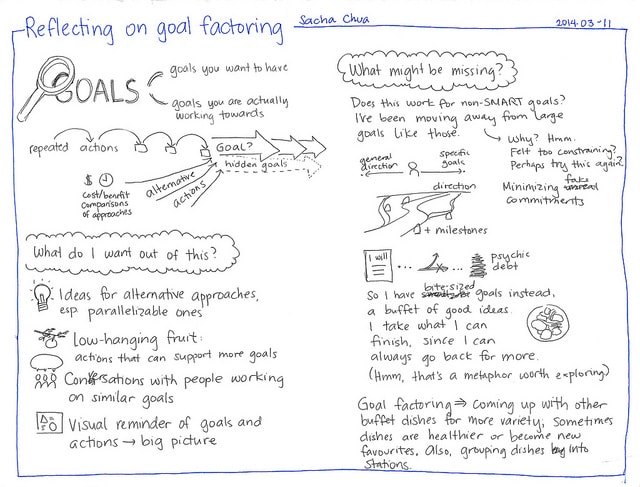
Ah, FOMO (Fear of missing out). The college student’s nemesis.
In my experience, this awful feeling can be caused by a million different things. Sometimes it’s jealousy. Sometimes it’s envy. Sometimes it’s fear. Sometime it’s boredom. Sometimes it’s regret. FOMO is a weird chameleon that likes to mold to your insecurities.
It can erupt anywhere, in relation to anything: Career, school, relationships, lifestyle, etc. You fear that you’re missing out on something crucial. That you’re being left behind in comparison to others. Or maybe that you don’t have what it takes. Sometimes FOMO is just “man, I wish I did Y instead of X because Z looks like they’re having so much fun/success/fillintheblank.”
Occasional FOMO pangs that nudge you in the right direction can be good. FOMO that makes you cross over into self-loathing territory leads to constant facepalming and internal criticism.
All in all, FOMO isn’t pleasant. It makes you feel lost. And it affects many, many people. Like… everyone. The people who spark FOMO in you get FOMO, too. It’s a FOMO-eat-FOMO world. Except, it doesn’t have to devour you.
Below, I’ll show you my two-factor plan to help you combat FOMO in any setting.
Table of Contents
First, the two main ingredients of FOMO:
- You find your own life unappealing
- You wish you could have somebody else’s life
Simple enough. But I should clarify that #2 shows itself in a hit-close-to-home way. FOMO isn’t as aggressive when it comes to celebrities; it’s sneakier and smarter than that. It shows up when we see the lives of our classmates, friends, and relatives. Their lives seem attainable but better. It’s like rose-tinted glasses that happen to come in your prescription.
You have to imagine FOMO as a gremlin that feeds off self-doubt and wants to steal your sanity, creativity, and empathy. FOMO is not useful. It likes to pretend it is (“I make you think and self-reflect,” it whispers in your ear), but deep down, we all know it isn’t. It just makes us feel bad. So let’s get rid of it, shall we?
Structure and spontaneity are my two keys to stopping FOMO in its tracks. Below, I’ll show you how to use them, step by step.
Structure

Dialogue with Yourself/Others
Maybe people you know are going out while you’re buried under a huge workload. Maybe everybody is getting prestigious career and academic opportunities and you’re feeling stuck and devalued.
The first step is to keep asking yourself, “What exactly bothers me so much about this?” Don’t worry if you feel irrational. A potentially insane explanation is still an explanation. Such as: Oh, I feel FOMO when I see people going out while I’m stuck working because I feel like I have to keep working or else I’ll never succeed. Mine your explanation for reasons behind your FOMO and its symptoms.
The explanation morphs into: Yeahhh, that mindset is a straight path to burnout. I’m going to bed early and texting people to let them know I’m alive tomorrow morning.
This is step 1 of creating the structure to crush FOMO. Talk out your FOMO with somebody or on paper. Take whatever you have FOMO about and laser down that ideal-actual gap until you have something that is workable. Where can you improve to get closer to ideal? What do you need to let go of – what’s not possible to change? Then, set a goal to make the doable change happen. Make your goal viable and the change something you believe – logically and intuitively – needs to happen.
Authenticity and Social Media
Social media plays a big role in causing FOMO. Sometimes it’s not about unhealthy behaviors/mindsets. Sometimes you just see somebody’s picture and go: I want I want I want. Polished aesthetics seduce you into thinking you want something. But, in fact, you really don’t want it.
Check in with yourself when you feel FOMO but there doesn’t seem to be a deeper reason beyond “I want it.”
Switch out the I want I want I want for the old brag of your heart, I am I am I am (Sylvia Plath). Then limit social media to people who you find truly inspirational or you really want to keep up with. If they consistently make you feel bad, are they worth a follow?
Also, change the language in your head regarding what you have FOMO about. Shut down any mental chatter about wishing to do something once you’ve realized you’d actually get JOMO (joy in missing out) out of not doing it. “I choose not to. I decided not to.” Be clear and decisive.
Spontaneity

Here’s a twist on the standard “highlight-reel, behind-the-scenes comparison” advice: Forget about their highlight reel, forget about your behind-the-scenes. Construct a better highlight reel. You don’t have to imagine the mundane or horrible parts of somebody’s life. Focus on making your life more appealing to yourself.
Positivity
Write 3 Good Things every day related to what you lasered down to in Structure. It’s like a gratitude journal, but it’s more active than reactive. It’s things you truly want, that you can control.
Example:
FOMO: Losing friendships, becoming a hermit because so overwhelmed, never sleeping like a normal human being ever again, never invited to a social event ever again, becoming a bore.
Symptoms: Workaholism, perfectionism, Imposter Syndrome
3 Good Things – 9/26
- I went to sleep at 1am today instead of 4am! (Baby steps)
- Turned down chairing a committee. I would’ve done it in the past just to prove I was smart and capable. That gut check. Haven’t used you in awhile.
- Texted my friends (tbh was scared they forgot I was alive or they were annoyed that I turned down so many invites) and asked what was going on this weekend. I’m going apple picking with them on Saturday! Woo. Exercise and socialization? Go me.
Make your FOMO dialogue and authenticity checks “hurrah!” activators. Give yourself permission to be proud for making progress in your focus areas. You’re changing your behavior, mindset, and addressing fears. Those are big things with amplified results even with the tiniest step forward.
Adventuring
Changing isn’t all growing pains. Do something new if your old habits haven’t been working. Reach out to resources and people.
For example:
- Getting FOMO about falling behind at work while everybody advances to better jobs? Look up accessible opportunities, get new people to look over your resume, read career-related books, take an free online-based class, make a web portfolio.
- Getting FOMO about not having a life outside of work/school? Join Meetup and go to a local event, find restaurants on Yelp and try new foods, look over lists of clubs to join, research hobbies to pick up, ask around and check out local blogs for cool things to do.
There’s so much you can learn, discover, and experience as you slowly shake off FOMO and replace it with trusting yourself and taking action.
What do you have FOMO about?
How does it impact you? How do you keep in check the negativity that comes with FOMO? Any advice for other CF readers?

So, I recently picked up journaling to help with FOMO and anxiety, because it doesn’t affect me as much because I find myself to be pretty confident and all, but journaling really helps at the end of the day just to reflect on what I am feeling and thinking. But I love the idea of the 3 positive things a day, gonna add that to my journaling. 🙂
I love journaling too! I recently picked up daily journaling again. It’ll be interesting to reread my college journals when I’m 30 years old or so.
Depression and anxiety feels like I’m missing out on life. Every aspect of it.
That’s true. Depression and anxiety made me feel like I was going too fast without doing enough. It was rough.
I hesitate to advocate for any specific medical advice because I’m clearly not a professional. However, CBT and certain lifestyle adjustments (the basic trifecta of sleep, eat, exercise) helped me.
Take it slow, be good to yourself, and take care of yourself. Captain Awkward has good advice about functioning with depression and not beating yourself up: https://captainawkward.com/2013/02/16/450-how-to-tighten-up-your-game-at-work-when-youre-depressed/ and https://captainawkward.com/2013/07/06/little-things-that-people-say-that-totally-shift-your-perspective/.
Self-care can be about enjoying yourself (which is important while depressed and feeling like everything blows) but, for me, self-care also involved being productive and keeping my living environment nice. UfYH is a great resource for cleaning while depressed.
Matt Haig has a wonderful blog post about living with depression and anxiety: http://www.matthaig.com/reasons-to-stay-alive/. This quote really helped me: ”Your mind is a galaxy. More dark than light. But the light makes it worthwhile … Even when the darkness is total. Always know that life is not still. Time is space. You are moving through that galaxy. Wait for the stars.”
Also, never feel bad about needing to take meds or see a therapist. I’m also always here for you guys if you want to talk.